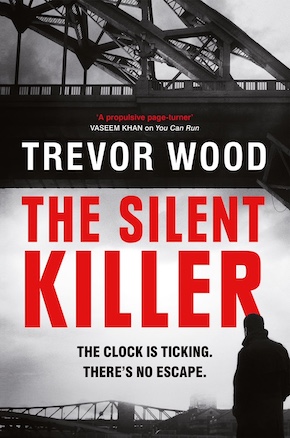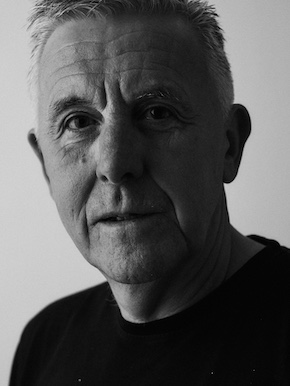Trevor Wood: A race against time and memory
by Farhana Gani
With The Silent Killer, acclaimed author Trevor Wood introduces a new series of gripping Newcastle-set police procedurals. Seasoned detective DCI Jack Parker is battling early-onset Alzheimer’s as he races against time to solve a string of revenge killings – while seeking to conceal his diagnosis from both family and colleagues.
THIS HIGH-STAKES CRIME NOVEL begins with a devastating car crash that lands Jack in hospital and claims the life of his trusted partner, Laura Kemp. In the aftermath, Jack receives the life-altering diagnosis that he carries the dementia gene. This revelation sets the clock ticking on his mental acuity, propelling him into a desperate race to solve not one, but two interconnected cases.
As Jack investigates a serial killer targeting former classmates from St Bede’s Middle School, he faces the unsettling reality of his own unreliable memories. The plot thickens when allegations surface that Laura was on a gangster’s payroll, connecting her to a blackmail scheme involving her father’s secret son.
What sets this novel apart is its unflinching exploration of Jack’s deteriorating mental state. His personal struggle adds a poignant layer of drama that transcends the usual rhythms of the detective genre. His decision to conceal his diagnosis from both family and colleagues creates a pressure cooker of internal conflict, leading to erratic behaviour that threatens to derail both his investigation and his personal relationships.
The story masterfully blends a classic police procedural with deep character study and family drama.”
Wood navigates the psychological terrain of Jack’s condition, offering readers intimate access to his fears, determination, and moments of vulnerability. Particularly moving is Jack’s relationship with his much older brother Philip, the only person he is able to confide in, which underscores the emotional weight of his situation in the face of an uncertain future.

The story masterfully blends a classic police procedural with deep character study and family drama. The supporting cast is richly drawn, from Jack’s concerned wife Helen and teenage son Aidan to his watchful colleagues DS Leon Johnson and DS Emma Steel. These characters, along with enigmatic DCS Bob Curtis, create a complex web of relationships that add depth and nuance to the central mystery.
A sardonic humour cuts through the darkness of the subject matter. Jack’s cynical one-liners and the banter between characters serve as a release valve, balancing the mounting tension with camaraderie and wit.
As the first in what promises to be an engrossing series, this twisty novel sets a high bar. It has all the ingredients to make Jack Parker a household name alongside iconic detectives like Morse, Vera or Catherine Cawood.
Farhana: The flawed detective is a common archetype in police procedural thrillers, but this is the first I’ve come across where the flaw is memory loss. What was the impetus for adopting this angle?
Trevor: I was becoming increasingly aware of the devastating impact that Alzheimer’s disease was having on many of my friends. I’m also of an age where my memory is fading through the normal ageing process but I can’t help wondering if it’s the start of something worse and suspect that I’m not alone in this. My way of dealing with these issues is to explore them in my writing. I also read Nadine Matheson’s excellent thriller The Binding Room, which feature’s a cop’s wife with early onset dementia and thought that it would be really interesting if, rather than a minor character, that was a senior cop.
At heart he’s a deeply pragmatic man who is solution-driven and most of his decisions are simply the easiest way for him to either protect his family or to bring criminals to justice.”
When we are introduced to Jack in the early scenes, we see a man having to deal with a potent mix of shock, grief, fear and determination as he comes to terms with his diagnosis and charts a path forward in the face of an uncertain future. What inspired you to weave weighty themes into a twisty, well-crafted whodunit?
I’ve always loved the maxim that the best way to create a story is to ‘put your character up a tree and throw rocks at them.’ And I think the heavier the rocks the better the story. Jack’s resolve is really put to the test in The Silent Killer and his ability to dodge the rocks or absorb the pain of being hit by them gives readers a clear idea of his strength of character. My writing process always begins with a character; the situation and plot spring from there.
On the face of it, a series about a cop with early-onset dementia is itself a ticking clock. Are you constantly monitoring immunotherapy drug trials that could yet come to Jack’s aid? Is there a limit to how many books you plan in this series?
Yes! I’m trying to set the books very much in the present. The Silent Killer ends in July 2024, the same month it was published. There are some very interesting drugs being developed right now that may change the future for Alzheimer’s sufferers in that they attack the causes rather than the symptoms. They are not without difficulties though, with some serious side effects, and it may be a long time before they become available, if ever. I’m keeping a very close eye on them and I don’t think it’s a plot spoiler to mention that Jack is given a place on a trial of one of those drugs in book 2. All of which is a long-winded way of saying I have no idea how long the series will be!

Jack has plenty of other flaws too – he’s stubborn, a hard drinker and a rule-breaker, and yet he’s proving to be remarkably disciplined. Tell us more about Jack’s multi-faceted personality and how he is able to adapt mentally following his diagnosis.
He was a hard drinker but has mostly given up in his bid to slow down the development of his condition. His rule-breaking is also part of that battle in that he now has little left to lose so is less concerned with the consequences of his actions. At heart he’s a deeply pragmatic man who is solution-driven and most of his decisions are simply the easiest way for him to either protect his family from the damage he believes his condition will cause them or to bring criminals to justice, especially the killer of one of his former friends.
Jack is in a loving marriage, and yet he is unable to trust his wife enough to disclose his condition with her. What’s holding him back?
Jack’s father had the same disease and became violent, destroying his family and sending Jack’s mother into an early grave, and Jack is determined that he won’t repeat that. Helen’s a deeply caring woman and would abandon her job, one she has fought long and hard to get, to take care of him and he doesn’t want to be the cause of that.
Jack persuades himself that leaving his wife and their teenage son Aidan is the best way of protecting them. Tell us about Jack’s relationship with them and why he’s able to easily get away with this, without disclosing the truth.
Jack and Helen are soulmates. But he knows that she will gladly sacrifice her life to look after him when his condition deteriorates and he does not want that to happen. Conversely she knows him so well that, when she realises he’s hiding something from her, she knows it won’t be simple to find out what it is and has to take a more devious approach. There’s a kind of cat-and-mouse game being played between them with Aidan caught in the middle.
There’s only about one degree of separation between the people here – everyone knows someone who knows someone – so it’s a great location for a crime novel, there’s nowhere to hide!”
The only person Jack feels safe talking to is his brother Philip. They share an unusual dynamic and their mutual support is a thing of beauty, particularly as it’s not common to read about male siblings who look out for one another. Tell us more about the importance of this relationship in your book.
With Jack hiding his condition from his wife and colleagues I realised he needed a confidant to discuss things with so introduced his older brother Philip to the book early on. I had great fun making him an ex-Catholic priest so that some of their conversations almost take the form of a confession. Philip had to abandon his calling to look after Jack when their family imploded due to their father’s condition. He feels a combination of guilt for leaving them and resentment for having to come back, which adds an interesting dynamic to the mix.

The location is a vital element of the book. Why did you choose to set it in and around Newcastle?
Newcastle has been my home town for more than thirty years. Before that I had lived a fairly peripatetic life, including 16 years in the Royal Navy, and it’s the first place that has truly felt like home. My books are love letters to the city that has welcomed me with open arms. It’s also fairly compact and there’s only about one degree of separation between the people here – everyone knows someone who knows someone – so it’s a great location for a crime novel, there’s nowhere to hide!
There’s a recurring theme of childhood trauma. We see this in Jack’s own childhood, growing up with a father suffering from Alzheimer’s, as well as the serial killer investigation Jack’s assigned to solving. Tell us why this is important to you.
People are often products of their childhood and I’m interested in the differences between those who can overcome such difficulties and those who can’t. I also wanted to draw the comparison between someone who is haunted by his memories and someone who is terrified of losing their memories.
Whilst the novel sits in the police procedural crime genre, it’s much more than that. Alongside two crime investigations, this is also a story of a man, his family and his future in the face of a health crisis. How would you position your book?
I try to leave that to the marketing people. I aim to write crime novels that deal with social issues, homelessness and abuse of power in previous books, for example, and fill them with complex, colourful characters and hope that people enjoy that. It seems a little soulless to aim for a specific market and I’m not particularly interested in following trends. Writing a book is a long process and I have to be fully committed to what I’m writing to spend up to a year working on it!
The humour throughout is dark and sardonic. There’s playful banter between colleagues, whilst Jack often dishes up cynical one-liners. How easy, or not, is it to write with humour when tackling heavy subject matter?
I think it’s essential and replicates the reality. Most people in jobs that deal with life and death, such as soldiers and firemen, use dark humour as a coping mechanism. I was in the Royal Navy during the Falklands War so have first-hand experience of this. Also I used to write comedy plays so am inclined to use humour but I try to tone it down a little in my crime novels.
There are prickly relationships between Jack and his boss DCS Bob Curtis, and between his younger colleagues Leon Johnson and Emma Steel. Jack’s very careful around all of them, and they’re keeping an eye on him too. Yet it’s a close-knit unit and Jack is clever at deflecting attention away from himself. How long is he going to be able to keep this up?
I think his attempts to keep his condition a secret will gradually unravel during the course of the series but I like these things to happen organically and have a strong resistance towards planning them so can’t be more specific than that.
The Silent Killer is a riveting character-led, plot driven novel and a TV adaptation will surely be in the pipeline. Are you a fan of TV crime dramas? And which shows would you particularly recommend?
The Silent Killer is attracting a lot of interest from TV companies and yes, I’m a big fan of crime dramas. My favourite is the French series Spiral which is full of beautifully drawn characters and highly complex relationships. More recently I’d highly recommend Blue Lights for similar reasons.
—

Trevor Wood is a successful playwright who has also worked as a journalist and spin-doctor for the City Council since serving in the Royal Navy. He holds an MA in Creative Writing (Crime Fiction) from UEA and runs the Faber Academy’s Crime Writing Course in Newcastle. His previous novels are The Man on the Street (Quercus, 2020), which won the CWA John Creasey New Blood Dagger and the Crimefest Specsavers Debut Crime Novel of the Year, and was shortlisted for the Theakston’s Old Peculier Crime Novel of the Year. It was followed by One Way Street in 2021 and the final book of the Jimmy Mullen trilogy, Dead End Street, in 2022. You Can Run, a standalone thriller set in Northumberland, was longlisted for the 2024 Theakston’s Old Peculier Crime Novel of the Year. The Silent Killer is published by Quercus in hardback, eBook and audio download.
Read more
trevorwoodauthor.co.uk
@TrevorWoodWrite
@quercusbooks
Author photo by Paul Reich
Farhana Gani is a freelance copywriter and book scout for film and TV, and a founding editor of Bookanista.
@farhanagani11
@bookanista
wearebookanista
bookanista.com/author/farhana

